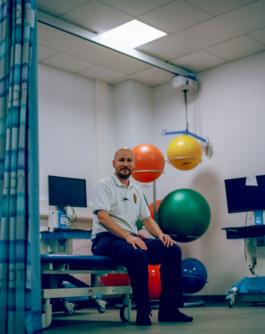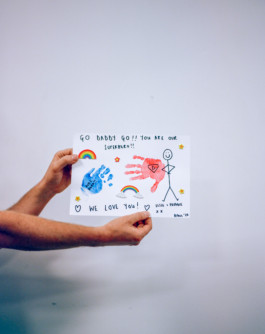David: “I remember asking her when does this get any easier? And she said it never does and the day it does is when you should stop”


listen:
Content warning: contains descriptions of death, dying and bereavement
Photography: Myah Jeffers
Audio Producer: Sara Conkey
read:
My wife took the children’s hands and she dipped them into paint, so one was in blue, and one was in red paint. And then she put the handprints onto a white sheet of paper. And she’s almost used that to create a superhero with a red cape coming off. And then she’s written kind of the words ‘NHS hero’, and ‘We’re so proud of you, Daddy’. And what they usually do with them is put them in my bag, so it’s when I get to work and I go to get changed or get something out, and then I find this little note that really gives me a boost that I’m not expecting.
Even little things like having the handprints and – it sounds silly – but imagining almost holding their hands or sitting with them when they were going into sleep. It was just a very, very nice image for me when I was away from home.
I’m David McWilliams. I’m a Consultant Physiotherapist who works in the intensive care unit in Birmingham.
I think at the start of the year, there were reports coming out of China of a new virus, which I don’t think anybody overly took seriously, it was kind of background noise in the news. And when we got those first couple of patients coming through, suddenly we had the first person test positive, and then they followed very, very quickly. And they were probably some of the sickest patients I’d ever seen, right at that starting point. But even at that time, for the first week or two, the numbers were relatively small. I think we went up to 20 patients in our intensive care at one point, and then that even went down a little to 19, and 18. And it felt well, okay, this is there, but it’s - it’s manageable.
And then everything just went exponential. And in the space of seven days, we went from 18 patients in our intensive care to 96. And we would come in to 15 new admissions every day. They were sick. They weren’t these old, frail patients that we were expecting. We had a culmination of young people, we had a chap that just got back from skiing in France and visiting lots of friends. We had a young student from university. We opened another section of intensive care that was full within two days. We opened another section of intensive care, and that was full. And it started to feel at that point like it was running away from us, and when would this actually stop?
So I think one of the things about being a Respiratory Physiotherapist is very often people really don’t understand what we do. Generally, you hear ‘Oh you’re a physio, oh I’ve got a bad back’, or ‘Would you mind looking at my knee?’. It’s a real lack of perception of where we fit. And I think it’s a shame because we do such an important and such a vital job. And the easiest way to describe this is: if somebody has a chest infection, you cough up and clear secretions or phlegm that’s on your chest. When you get really poorly and you end up in hospital and you’re put into an induced coma and on a ventilator, you’re unable to cough and clear that for yourself. So what physiotherapists do is roll people from side to side, they shake their chests, they put tubes down. So with the COVID-19 patients, their chests were often very full of very thick secretions. It would take two physios, so one shaking and one putting the device down to suck out these secretions. So it’s very heavy, very labour-intensive work. And the first couple of weeks were very much that all the time. That’s all we were doing.
So there was one man who I particularly remember. He was young, 40s, had a family, had young children at home. And it felt at times like we were winning, but his condition did not improve. Seeing the distress from the partner… the distress. There were comments in the notes – for example ‘How am I supposed to tell my children?’. And then actually being around when that family, the wife, was brought in too. At that point, we were allowing one person to come in and be with the person when they passed away. And I think that one really hit home; that one I found really hard. I think I related to it in so many ways from the loss of my own father, from having my own children at home and really - what if this happened to me, and what would I be leaving behind, and how many people in the country are going through this right now?
It would be amazing if we could be these drilled robots that go in, emotionally detached, treat patients and leave. But such a cornerstone of my job is building that personal link and relationship with people. And I remember, my mom’s a nurse, and I remember saying to her - because I got really upset when one of the residents in her home had died - I said ‘When does this get any easier?’. And she said ‘It never does. And the day it does is when you should stop’. And I think that’s always stuck with me really, that you have to have that emotional connection to do what we do. You have to have that kind of care and compassion for the person that you’re treating and you’re dealing with and you have to treat those people as if it’s a member of your family. That’s what I wanted for my dad and that’s what my dad got.
I think one of the challenges is people’s understanding of what this severity of illness means. But I think there’s a perception often - I think it’s not helped by things like the TV shows where people are in comas for two months, and then they wake up, get out of bed and go home, and everything’s absolutely fine. When you’re in bed – if you’re in bed for a week, for example, in a coma – when you wake up, you’ve lost 20% of all your muscle. So people can’t sit, they can’t move, they can’t roll. You imagine: you’re going to somebody who probably feels the worst they’ve ever felt in their life, they wake up, they’re in pain, they’re uncomfortable, they’re scared. And then some smiley bald physio comes along and says, ‘Come on, we’re gonna get you out of bed, we’re gonna get you up’. And you think ‘That’s the last thing I want to do, is get moving or do anything, just leave me in bed’.
So I think so much of it is about trying to access who that person is, trying to understand who’s them, what drives them, what motivates them, but also giving them a part of you and telling them who you are and why you’re there.
And you always see quite a big psychological change in these patients as they’ve gone from being this critically ill person in bed, just seeing that little glimmer of them again, you’re almost giving them permission to be a person again. It’s a really nice transitional moment, and a really rewarding part of my job.
One of my big cases was a man who we’d started to get the cards being sent in, and the messages from the family. And there was a picture on the wall that his granddaughter had sent in, and it said ‘My superhero granddad’. And it talked about, ‘I can’t wait for you to come home and play football in the garden with me’. And I think that it obviously been written by them - it was by a three or four year old. But emotionally that obviously resonated with me because I could see my daughter running around in the garden and wanting to play, and this was their grandparent. I remember really looking forward to seeing him, I remember really wanting to push, and really committing to - I mean, we do with everybody - but you feel this vested interest in getting that person up. ‘I want to get you home, I want to get you on the phone, I want to get you back with your family’. And I think there were certain instances where you see that flash of their life and what it is outside and who they are. And it really kind of almost empowers you to do a little bit more.
It’s not just about saving lives. It’s about giving people their life back. And we did get him better and he went home.
I think this whole experience will live with me forever. But I think it’ll always be something I look back on and feel proud that I was a part of it and proud that I was in there helping.
Certainly with COVID-19 we lost a lot of the people that came to intensive care. But really focusing on the ones that made it and the ones that had that better outcome - I think they’re what keep you going.
An Empathy Museum project made with the support of NHS England and NHS Improvement, The Health Foundation, and Arts Council England